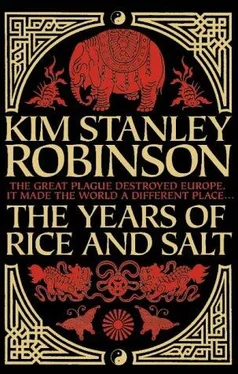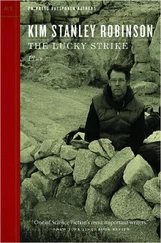Kim Robinson - The Years of Rice and Salt
Здесь есть возможность читать онлайн «Kim Robinson - The Years of Rice and Salt» весь текст электронной книги совершенно бесплатно (целиком полную версию без сокращений). В некоторых случаях можно слушать аудио, скачать через торрент в формате fb2 и присутствует краткое содержание. Год выпуска: 2003, ISBN: 2003, Издательство: Bantam Books, Жанр: Альтернативная история, на английском языке. Описание произведения, (предисловие) а так же отзывы посетителей доступны на портале библиотеки ЛибКат.
- Название:The Years of Rice and Salt
- Автор:
- Издательство:Bantam Books
- Жанр:
- Год:2003
- ISBN:0-553-10920-0
- Рейтинг книги:5 / 5. Голосов: 1
-
Избранное:Добавить в избранное
- Отзывы:
-
Ваша оценка:
- 100
- 1
- 2
- 3
- 4
- 5
The Years of Rice and Salt: краткое содержание, описание и аннотация
Предлагаем к чтению аннотацию, описание, краткое содержание или предисловие (зависит от того, что написал сам автор книги «The Years of Rice and Salt»). Если вы не нашли необходимую информацию о книге — напишите в комментариях, мы постараемся отыскать её.
The Years of Rice and Salt — читать онлайн бесплатно полную книгу (весь текст) целиком
Ниже представлен текст книги, разбитый по страницам. Система сохранения места последней прочитанной страницы, позволяет с удобством читать онлайн бесплатно книгу «The Years of Rice and Salt», без необходимости каждый раз заново искать на чём Вы остановились. Поставьте закладку, и сможете в любой момент перейти на страницу, на которой закончили чтение.
Интервал:
Закладка:
A haze like the one that blew out of the Gobi.
Sand in the air, sand and fine dust. Land ho!
Very low land. The sea and sky
Both turn the same brown
Before catching sight of a stone tower,
Then a great stone breakwater, fronting a harbor.
One of the sailors happily named it: “Alexandria!” Bold had heard the name, though he knew nothing about it. Neither do we; but to find out more, you can read the next chapter.
3
His captors sailed to a beach, anchored with a stone tied to a rock, tied Bold up securely, and left him in the boat under a blanket while they went ashore.
It was a beach for small boats, near an immense long wooden dockfront behind the seawall, which served much bigger ships. When the men came back they were drunk and arguing. Without untying anything but his legs, and with no more words to him, they pulled Bold out of the boat and marched him down the great seafront of the city, which appeared to Bold dusty and salty and worn down, stinking in the sun like a dead fish, of which there were indeed many scattered about. On the docks before a long building were bales, boxes, great clay jars, netted bolts of cloth; then a fish market, which made his mouth water at the same time that his stomach flopped.
They came to a slave market. A small square with a raised platform in its middle, somewhat like a lama’s teaching platform. Three slaves were quickly sold. The women being sold garnered the most attention and comment from the crowd. They were stripped of all but the ropes or chains holding them, if such were necessary, and stood there listlessly, or cowered. Most were black, some brown. They seemed to be at the butt end of auction day, people selling off leftovers. Before Bold an emaciated girl of about ten years was sold to a fat black man in dirty silk robes. The transaction was completed in a kind of Arabic; she sold for some unit of currency Bold had never heard of before, the payment in little gold coins. He helped his captors get his crusted old clothes off. “I don’t need tying,” he tried to tell them in Arabic, but they ignored him and chained his ankles. He walked onto the platform feeling the baked air settle on him. Even to himself he emitted a powerful smell, and looking down he saw that his time in the empty land had left him about as fleshless as the little girl before him. But what was left was muscle, and he stood up straight, looking into the sun as the bidding went on, thinking the part of the Lapis Lazuli Sutra that went, “The ruffian demons of unkindness roam the earth, begone! begone! The Buddha renounces slavery!”
“Does he speak Arabic?” someone asked.
One of his captors prodded him, and in Arabic he said, “In the name of God the merciful, the compassionate, I speak Arabic, also Turkic, Mongolian, Ulu, Tibetan, and Chinese,” and he began to chant the first chapter of the Quran as far as he remembered it, until they pulled his chain and he took this as a sign to stop. He was very thirsty.
A short, slight Arab bought him for twenty somethings. His captors seemed pleased. They handed him his clothes as he stepped down, slapped him on the back and were off. He began to put on his greasy coat, but his new owner stopped him, handing him a length of clean cotton cloth.
“Wrap that around you. Leave the other filth here.”
Surprised, Bold looked down at the last vestiges of his previous life. Dirty rags only, but they had accompanied him this far. He pulled his amulet out of them, leaving his knife hidden in a sleeve, but his owner intervened and threw it back onto the clothes.
“Come on. I know a market in Zanj where I can sell a barbarian like you for three times what I just paid. Meanwhile you can help me get ready for the voyage there. Do you understand? Help, and it will go easier for you. I’ll feed you more.”
“I understand.”
“Be sure that you do. Don’t think of trying to escape. Alexandria is a very fine city. The Mamluks keep things stricter than sharia here. They are not forgiving of slaves that try to escape. They’re orphans brought here from north of the Black Sea, men whose parents were killed by barbarians like you.”
In fact Bold himself had killed quite a few of the Golden Horde, so he nodded without comment.
His owner said, “They have been trained by Arabs in the way of Allah, and now they are more than Muslim.” He whistled at the thought. “Trained to rule Egypt apart from all lesser influences, to be true only to the sharia. You don’t want to cross them.”
Bold nodded again. “I understand.”
Crossing the Sinai was like traveling with a caravan crossing one of the deserts of the heartland, except this time Bold was walking with the slaves, in the cloud of dust at the back of the camel train. They were part of the year’s haj. Enormous numbers of camels and people had tramped over this road through the desert, and now it was a broad dusty smooth swath through rockier hills. Smaller parties going north passed by to their left. Bold had never seen so many camels.
The caravanserai were beaten and ashy. The ropes tying him to his new master’s other slaves were never untied, and they slept in circles on the ground at night. The nights were warmer than Bold was used to, and this almost made up for the heat of the days. Their master, whose name was Zeyk, kept them well watered and fed them adequately at night and at dawn, treating them about as well as his camels, Bold observed: a tradesman, taking care of the goods in his possession. Bold approved of the attitude, and did what he could to keep the bedraggled string of slaves in good form. If they all kept the pace it made the walking that much easier. One night he looked up and saw the Archer looking down on him, and he remembered his nights alone in the empty land.
The ghost of Temur,
The last survivor of the fisherfolk,
The empty stone temples open to the sky,
The days of hunger, the little mare,
That ridiculous bow and arrow,
A red bird and blue bird, sitting side by side.
They came to the Red Sea, and boarded a ship three or four times as long as the one that had brought him to Alexandria, a dhow or zambuco , people called it both. The wind always blew from the west, sometimes hard, and they hugged the western shore with their big lateen sail bellied out to the east. They made good time. Zeyk fed his string of slaves more and more, fattening them for the market. Bold happily downed the extra rice and cucumbers, and saw the sores around his ankles begin to heal. For the first time in a long time he was not perpetually hungry, and he felt like he was coming out of a fog or a dream, waking up more each day. Of course now he was a slave, but he wouldn’t always be one. Something would happen.
After a stop at a dry brown port called Massawa, one of the hajjira depots, they sailed east across the Red Sea and rounded the low red cape marking the end of Arabia, to Aden, a big seaside oasis, indeed the biggest port Bold had ever seen, a very rich town of green palms waving over ceramic roofs, citrus trees, and numberless minarets. Zeyk did not disembark his goods or slaves here, however; after a day on shore he came back shaking his head.
“Mombasa,” he said to the ship’s captain, and paid him more, and they sailed south across the strait again, around the horn and Ras Hafun, then down the coast of Zanj, sailing much farther south than Bold had ever been. The sun at noon was nearly directly overhead, and beat on them most cruelly all day, day after day, with never a cloud in the sky. The air baked as if the world were an oven. The coast appeared either dead brown or else vibrant green, nothing in between. They stopped at Mogadishu, Lamu, and Malindi, each a prosperous Arab trading port, but Zeyk only got off briefly at them.
Читать дальшеИнтервал:
Закладка:
Похожие книги на «The Years of Rice and Salt»
Представляем Вашему вниманию похожие книги на «The Years of Rice and Salt» списком для выбора. Мы отобрали схожую по названию и смыслу литературу в надежде предоставить читателям больше вариантов отыскать новые, интересные, ещё непрочитанные произведения.
Обсуждение, отзывы о книге «The Years of Rice and Salt» и просто собственные мнения читателей. Оставьте ваши комментарии, напишите, что Вы думаете о произведении, его смысле или главных героях. Укажите что конкретно понравилось, а что нет, и почему Вы так считаете.












